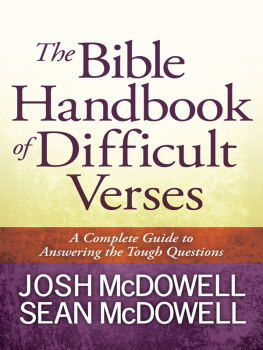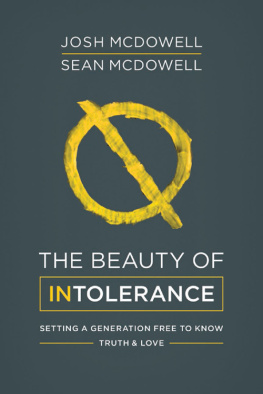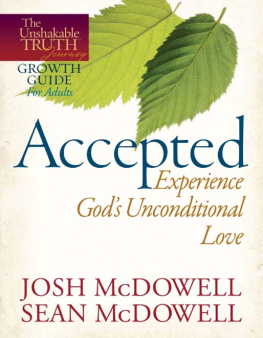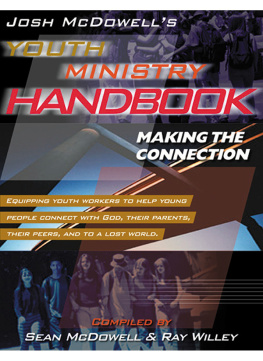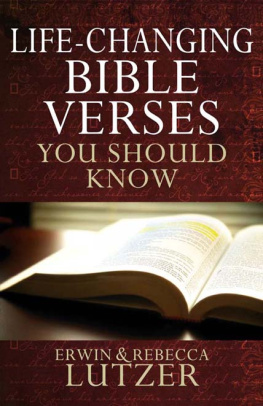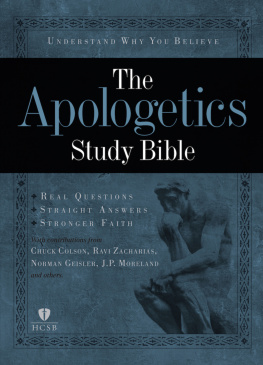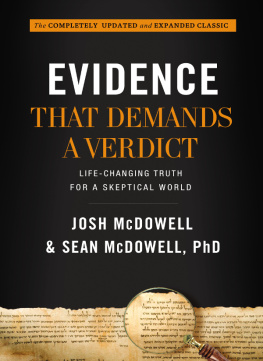

HARVEST HOUSE PUBLISHERS
EUGENE, OREGON
Unless otherwise indicated, all Scripture quotations are from the second edition of the Holy Bible, New Living Translation, copyright 1996, 2004, 2007 by Tyndale House Foundation. Used by permission of Tyndale House Publishers, Inc., Carol Stream, Illinois 60188. All rights reserved.
Verses marked NIV are taken from the Holy Bible, New International Version, NIV. Copyright 1973, 1978, 1984, 2011, by Biblica, Inc. Used by permission of Zondervan. All rights reserved worldwide. www.zondervan.com
Verses marked NASB are taken from the New American Standard Bible, 1960, 1962, 1963, 1968, 1971, 1972, 1973, 1975, 1977 by The Lockman Foundation. Used by permission. (www.Lockman.org)
Verses marked NLT are taken from the first edition of the Holy Bible, New Living Translation, copyright 1996 by Tyndale House Foundation. Used by permission of Tyndale House Publishers, Inc., Carol Stream, Illinois 60188. All rights reserved.
Verses marked KJV are taken from the King James Version of the Bible.
Verses marked NKJV are taken from the New King James Version. Copyright 1982 by Thomas Nelson, Inc. Used by permission. All rights reserved.
Verses marked HCSB are taken from the Holman Christian Standard Bible, Copyright 1999, 2000, 2002, 2003 by Holman Bible Publishers. Used by permission. Holman Christian Standard Bible, Holman CSB, and HCSB are federally registered trademarks of Holman Bible Publishers.
Cover by Koechel Peterson & Associates, Inc., Minneapolis, Minnesota
THE BIBLE HANDBOOK OF DIFFICULT VERSES
Copyright 2013 by Josh McDowell Ministry and Sean McDowell
Published by Harvest House Publishers
Eugene, Oregon 97402
www.harvesthousepublishers.com
ISBN 978-0-7369-4944-6
Library of Congress Cataloging-in-Publication Data
McDowell, Josh.
The Bible handbook of difficult verses / Josh McDowell and Sean McDowell.
p. cm.
ISBN 978-0-7369-4944-6 (pbk.)
ISBN 978-0-7369-4945-3 (eBook)
1. BibleCriticism, interpretation, etc.Miscellanea. 2. ApologeticsMiscellanea. I. McDowell, Sean. II. Title.
BS511.3.M3365 2013
220.6dc23
2012033401
All rights reserved. No part of this electronic publication may be reproduced, stored in a retrieval system, distributed, or transmitted in any form or by any meanselectronic, mechanical, digital, photocopy, recording, or any otherwithout the prior written permission of publisher. The authorized purchaser has been granted a non-transferable, non-exclusive, and non-commercial right to access and view this electronic publication and agrees to do so only in accordance with the terms of use under which it was purchased or transmitted. Participation in or encouragement of piracy of copyrighted materials in violation of authors and publishers rights is strictly prohibited.
Contents
Difficult Passages from
Difficult Passages from
Difficult Passages from
Difficult Passages from
Difficult Passages from
Difficult Passages from
Difficult Passages from
We wish to recognize the following individuals for their valuable contribution to this handbook.
Dave Bellis, my (Joshs) friend and colleague for 36 years, for collaboration with us on all the passages covered in this handbook, researching the answers, writing the rough draft, and folding in all our edits and revisions to create the final draft. We recognize Daves insights and knowledge of Scripture and are deeply grateful for his contribution.
Ken Turner for reviewing the manuscript and providing helpful insight in his areas of expertise.
Becky Bellis for laboring at the computer to ready the manuscript.
Terry Glaspey of Harvest House for his vision and guidance in shaping the direction and tone of this work.
Paul Gossard of Harvest House for the expert editing and insight he brought to the manuscript completion.
Josh McDowell
Sean McDowell
Have you ever read a passage in the Bible and thought, Now, what does that mean? Or perhaps the passage made sense but you wondered, Is that really relevant to us today? And then there are critics today that scoff at the idea of taking the Bible seriously. Some contend that it is riddled with inaccuracies, errors, and out-of-date laws and teachings that border on the ridiculous for a modern society.
The apostle Paul said to live wisely among those who are not believers, and make the most of every opportunity. Let your conversation be gracious and attractive so that you will have the right response for everyone (Colossians 4:5-6). Having the right answer for everyone isnt easy. Sometimes when were stuck about what this passage means or how that scripture is to be applied, we may be tempted to say, We take these things by faith.
But again Paul reminds us that if someone asks about your Christian hope, always be ready to explain it. But do this in a gentle and respectful way (1 Peter 3:15-16). What we hope to have done in this Bible Handbook of Difficult Verses is provide the right answer to help you be ready to explain it. We wont be answering every possible question there is about what the Bible teaches. What we will do is offer answers by trusted scholars who have given much study and thought to many of the tough issues of the Bible. Not all scholars agree on how to explain certain passages. So we will, at times, provide differing opinions and interpretations by various scholars on both sides of the issue.
We will not shy away from some of the tough issues of Scripture either. We will tackle passages that are difficult to understand, some that have commonly been misinterpreted, and portions of the Bible that some believe contain mistakes, errors, or contradictions. Our hope is that the explanation of over 240 passages in this handbook will, first and foremost, give you a deeper love for God and his Word. And then we hope it provides you with answers to your questions to equip you to confidently explain your faith to others.
Use this handbook as you would a Bible commentary or study Bible. When you are studying your Bible and come across a passage you have questions about, check to see if it is covered in this handbook. You can also check out the various issues, subjects, or Scripture passages covered by consulting the indexes.
Not all passages we cover require the same amount of explanation. Some only require concise answers. Others take more space to explain a more complex issue. We have tried in each case to provide satisfying answers to the questions surrounding each Scripture passage listed.
Before we begin, we want to establish six ground rules in approaching any difficult or hard-to-understand passage of Scripture. This will provide a context or grid within which we examine and understand the Bible. We cover these six ground rules by answering six questions about the Bible.
1. Is the Bible Inspired by God?
When the apostle Paul said that all Scripture is inspired by God (2 Timothy 3:16) he did not mean that the Bible was merely an inspirational book. He used a specific word in the Greek language theopneustos, which literally means God-breathed ( theos , God; pne , to breathe). All of Scripture is God-breathed, which means the written words in the Bible are from God. That is why we refer to Scripture as the Word of God.
Jesus referred to Scripture this way when he told the Pharisees that they were misusing scriptural teaching. He said, So you cancel the word of God [Scripture] for the sake of your own tradition (Matthew 15:6). The apostle Paul explained how the Jewish people have been entrusted with the very words of God (Romans 1:3 NIV ). So when you read the Bible you are not simply reading an inspirational book; you are reading words from God.
Next page
